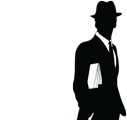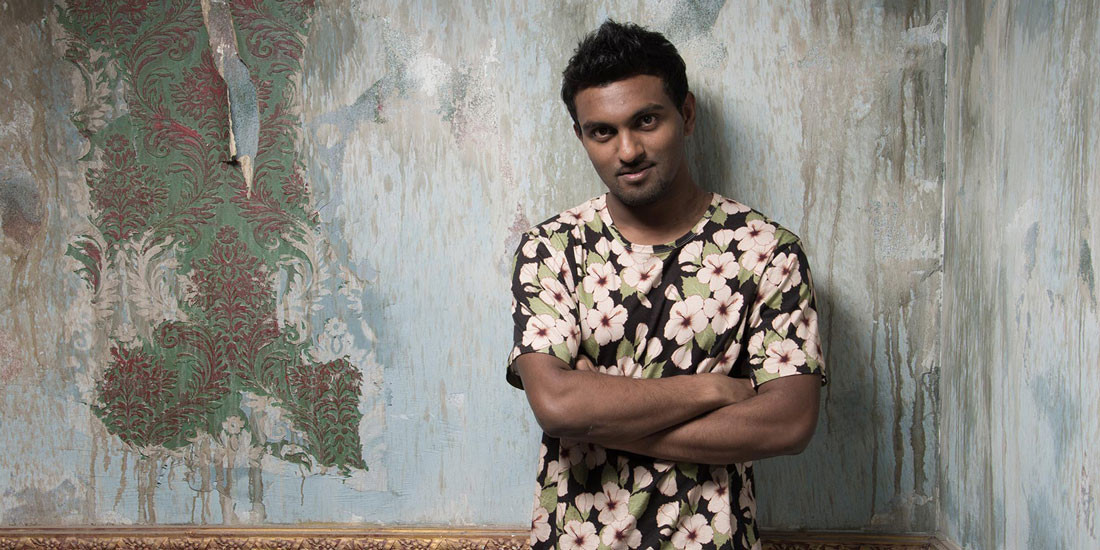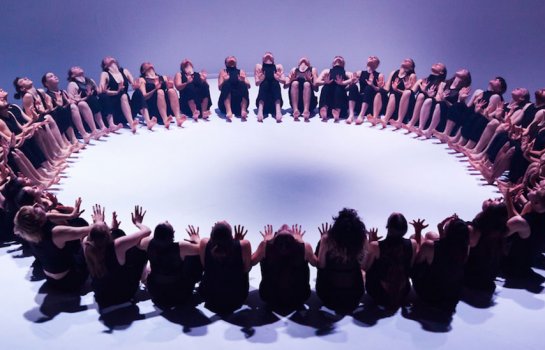Nazeem Hussain, comedian
I don't think comedy necessarily solves any social ills or big questions, but it definitely helps people ask the right questions ...
Nazeem Hussain first came to the nation’s attention as one of the two minds behind the SBS comedy series Legally Brown. The show blended pre-recorded comedy sketches and stand-up in front of studio audiences and was a massive success. Since the conclusion of Legally Brown, Nazeem has struck out on his own as a stand-up comedian, earning rave reviews for his politically charged and socially conscious comedy. 2016 is set to be the biggest year in Nazeem’s career, with festival appearances and international tours on the cards. Before he hits Brisbane in March for the annual Brisbane comedy festival, we spoke to Nazeem about his childhood love of comedy, navigating the industry, being mugged by the Yakuza and scoring free chocolate.
When did you first discover your knack for comedy? Do you remember the first joke you got a laugh from?
You know what, I’ve always been a bit of an idiot somewhat, in my family and around my group of friends. I’d always do stuff to make people laugh or get a reaction. I think my earliest memory was from when I was five or six years old and I just used to sit on the front steps of my house and whenever someone walked past I’d yell “G’day mate! How’s it goin’?” and my Sri Lankan family inside would be cracking up laughing at me making fun of the neighbours. It was just me trying to heckle pedestrians, but I knew they were laughing so that definitely encouraged me. I also used to dress up in my sister’s clothes and act like a little girl and try to make my family laugh. I dressed up as Pauline Hanson one time when I was in school. I just remember it was for a grade six presentation, when kids would come up to recite poetry or sing songs I came out wearing red high heels, red lipstick, an orange wig to look like Pauline Hanson. I was a bit of weirdo, a weird kid.
Were you much of a fan of comedy when you were young? Did you have any comedic idols that helped spark the fire for making people laugh?
As a kid I used to love watching shows with characters – even if it was Sesame Street or things like that – any shows that had silly characters that I could impersonate. I love impersonating everything. Comedy wise, I memorised both of Eddie Murphy’s shows word for word – Delirious and Raw. Jim Carrey, I’m a big fan of his, too and Dave Chappelle, Margaret Cho and Chris Rock later on. As for Australian comedy – I watched all of Hey Hey, It’s Saturday. Anyone that made people laugh I was really intrigued by. I didn’t have one particular comedian that I loved, I just sort of absorbed comedy generally. I never though that one day I’d be a comedian – it never crossed my mind, I just loved comedy.
When did it become apparent that you might be able to have a crack at it professionally? What was the thing that made you realise there was a future there?
Well when I started doing stand-up I was only doing it at a community level at youth events when the projector broke down – I’d be the guy who got up and told jokes and talk to the crowd when things were being fixed. I was at Uni, just doing a little bit of open mic stuff and RAW Comedy. I still didn’t think of comedy as a full time thing, it was only something I was doing on the side. It was actually something I was doing while studying Law and Science and I pursued a full time job where I worked for a few years. I didn’t think about how I was going to get out of there until much later in the piece when I started doing more and more TV. I got offered a full time gig doing Legally Brown and it just sort of happened suddenly. The decision to do comedy full time just crept up on me but I guess, in hindsight, it wasn’t that surprising. I was doing more TV and it was clearly where my heart was and I was improving with each gig. When Legally Brown came up I just realised I could only do one or the other – I couldn’t balance both lives and I had to decide. I think I even asked work if I could take six months off to do the TV show. They said “Look, you’re not going to come back after, so don’t bother asking for a leave of absence – just go.” They sort of forced my hand on the matter. (laughs) Now the thought of going back sickens me. I can never imagine going back to that life.
Looking ahead to March, you are coming north for the Brisbane Comedy Festival with your new show Hussain in the Membrane – great name by the way. Without giving too much away, can you tell us what the show is about?
Thanks man, it was the only pun title I could come up with. I hope the show lives up to the title because you have to have a catchy title. I don’t like to theme the shows and make it about one idea or topic, it’s sort of just me trying to be funny with a range of stories. Like travelling the world, getting into fights, trying to survive in a way – that seems to be a running theme. I went to Japan and actually got mugged by the Yakuza! I went to a restaurant at 6:30 at night and had my food then I got a bill for 150,000 Yen, which is about $1500 Australian – it was quite an experience. There was an American in the restaurant that also got mugged, but he was mugged for about $990 – so there was a weird discrepancy in the race of mugging! I bargained my way out of that and left. At the time I was quite traumatised and pissed off but those sort of things make it into the show because when there is awkward tension there is definitively comedy.
How do you go about piecing together your shows? Do you scrap your material and start fresh each year or do you update your material with new bits and pieces?
Each year for each festival run I will do a brand new hour. I think when things happen I just write them down. I tend to write most clearly when I am pissed of and angry at something. Instead of taking it out on the situation or the person I just mine it for comedy. Whether that is something political or personal, it’s funniest when I can instil a punch line. Over the year I just walk around experiencing things and noting my feelings and I find that the sort of comedy that I enjoy doing is personal or something I can connect to – whether it is something on a grand scale or mundane, so long as I have personal connection to it, it becomes real for me and becomes real for the audience. Sometimes an abstract political comedy can be a little bit difficult for audiences to relate to. I listen to myself and my experiences first – but mostly I put dot points in my phone! Sometimes a week after putting a note in I’ll look at my phone and think “What am I talking about? ‘One sock’? I don’t know what that means.”
Your main break came about with Legally Brown, but you’d done amateur stand-up before that – I’d love to know how you go about mixing up the comedy for stand-up and television. What is the benefit of having experience in that medium?
Stand-up comedy is my favourite medium of comedy – you’ll hear people say it’s a purist form of comedy – for me it’s the most enjoyable because you are interacting with them immediately. TV is a lot more difficult and complicated, there are a lot of layers involved. It’s hard to get right, to sell a joke you need to make sure it looks right, sounds right, you have to make sure the scenario is believable and the stakes are a lot higher. The people who are watching aren’t necessarily interested in your comedy, you are almost intruding in the space whereas with stand up people are coming to you. Once you get it right I feel TV is much more of an accomplishment but there is a lot more involved.
The difference between television shows is big too. Legally Brown is my own show, people know what they are getting. Doing other television programs like panel shows means not everyone will know who you are and what you can do. Comedy on television in a bit role is challenging because people need to know and trust you in order to laugh at you. It’s not just a matter of being funny or not – people need to feel like they can trust you. I think that is a lot of what comedy is, even in stand up. People need to think they are in safe hands and that it’s not going to be an awkward hour. Additionally, with Legally Brown it was easy to forget that you are making something for an audience, a whole bunch of people that will see you walking around making an idiot of yourself. I think that makes for good comedy though, when you forget the audience exists.
You aren’t afraid to call attention to cultural and societal issues through your comedy – do you think comedy is a more effective way to get people talking about important issues affecting the nation? Once people trust you and you have that notoriety and platform, how do you use comedy to convey these issues?
I don’t think comedy necessarily solves any social ills or big questions, but it definitely helps people ask the right questions. With a joke often you are highlighting something absurd or hypocritical and its up to the audience to realise they hadn’t thought about a topic that way. It in a way is a soundtrack to proper political activism – comedy is anarchic inherently, it like to pokes fun in every direction and at power structures, particularly. Comedians tend to be troublemakers and have left-leaning tendencies. I think it asks questions more than solves problems but that’s important.
It’s about feeling empowered – the difference between comedy and writing an opinion piece is that comedy is an immediately a positive experience, you know you are going to be enjoying yourself and laughing. When you are laughing about something that upsets you, it puts you in a position of power and makes you the one laughing at something that is unfair. I think for people who go through difficult times it can bring strength. It brings me strength – I’m in a room with people who are also pissed off and angry with stuff so it is similar to being in a rally. That’s what comedy does – it makes you feel a bit more cocky and arrogant in your own views. It can preach to the converted but also ask questions people might not ever think to ask themselves.
What would you say is the message that you try to convey to audiences through your comedy?
Just don’t take yourself or life too seriously! (laughs) I think the world is run by idiots and I can help highlight that reality – that we are run by idiots and we believe a lot of things idiots say. Let’s make fun of that.
What’s the most important thing you’ve learned as you’ve become and adult and your career has taken off?
In terms of comedy, I look back at some jokes and routines that I thought were hilarious and now I can’t comprehend how it was a good routine. What I’ve learned most is that you can never too humble, you can never be too grounded. You have to constantly check yourself and your ego and you still have a long way to go and lots to learn. I think you have to keep working as it’s very easy to become complacent.
What are your thoughts on the state of Australian comedy right now? Are there any comedians that you think are on the cusp of becoming big?
There’s something about the Australian comedy community that’s great. It’s very supportive and encouraging. To me those that have been around for years and years are great mentors – it’s such a nice culture. People just want the best for each other and genuinely want to make better comedy for Australians. It’s a great scene and I think it is a bit under appreciated.
Luke McGregor is one of my favourite comedians and he is breaking now. Michael Hing is a very funny guy, Laura Davis is incredibly talented and Nakkiah Lui from Black Comedy is amazing too. You know someone that surprised me? He’s a rapper and a comedian now – Briggs! He is on Black Comedy and he is one of the funniest people I’ve ever met. Every time I’m in his presence I feel unfunny. Tien Tran, Becky Lucas – there is this new wave of comedians that is making a lot of noise and redefining what Australian comedy sounds like.
What do you have planned for the rest of the year? Any big things in the works for 2016?
Yeah, I’ll be doing the festival circuit all around the country. I’m going to Sri Lanka this week for a massive show! It’s a 3000 seater venue that they’ve booked me in – I hope they are able to fill it! My friend has been sending me photos of billboards they have up all over the city of my face. I don’t know how comedy works over there but that should be exciting. I’ll also doing some more television stuff, not Legally Brown but some other things – the next step, essentially developing the best things from Legally Brown into something. I can’t really say much at the moment, though!
Finally, what’s the best thing about being you right now?
The best thing about being me is sometimes I get free chocolate. (laughs) There is one cafe that I go to and the owner likes my comedy, I think. He gives me free chocolate all the time. No one else gets that stuff, but I do! That is the best thing about me! It’s weird though, when you are famous or get a little bit of profile doesn’t that mean that I should be paying a little bit more? I don’t know, I’m not going to question it.
Catch Nazeem Hussain when he comes to Brisbane with his new show Hussain in the Membrane for the Brisbane Comedy Festival in March. Purchase your tickets here.



